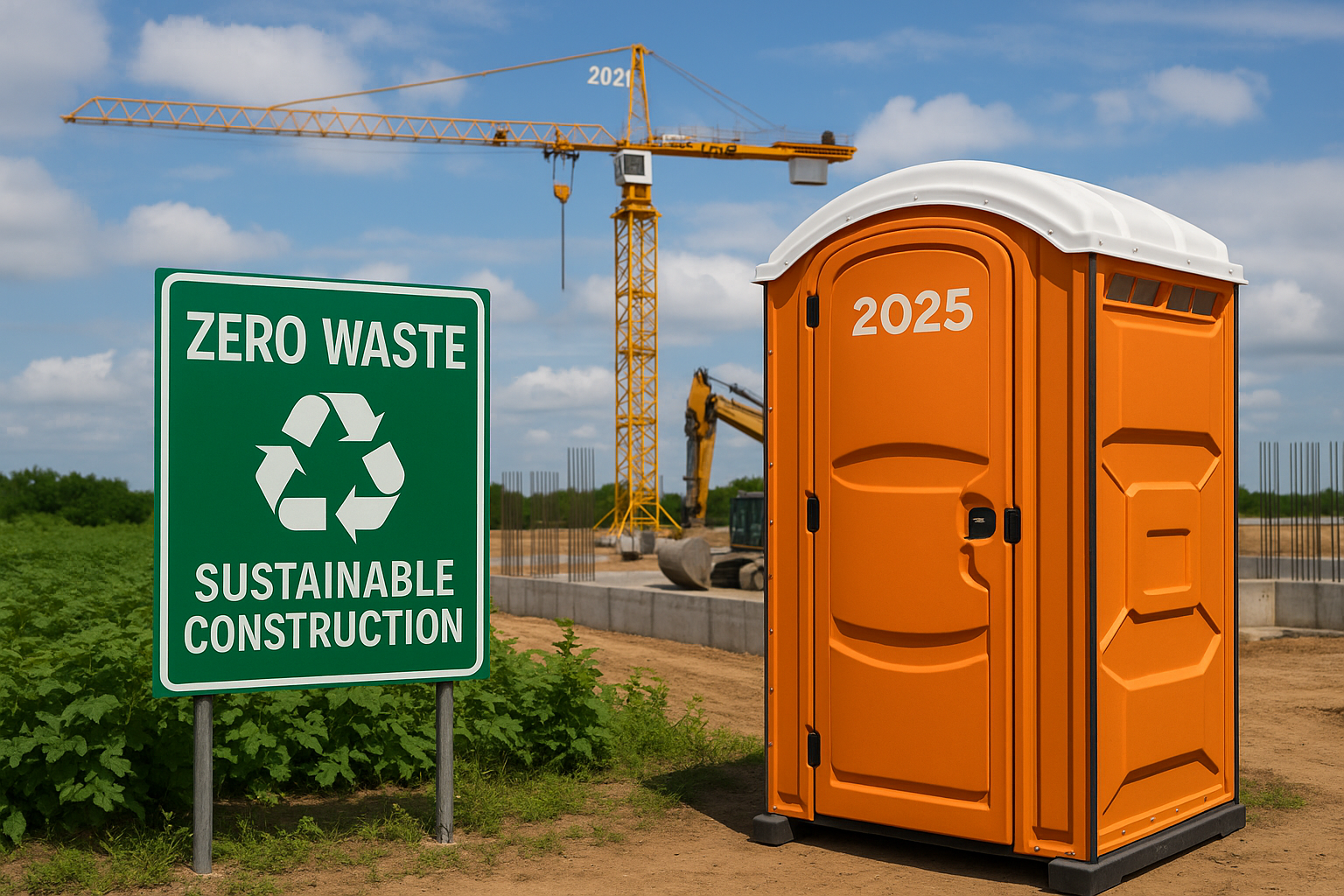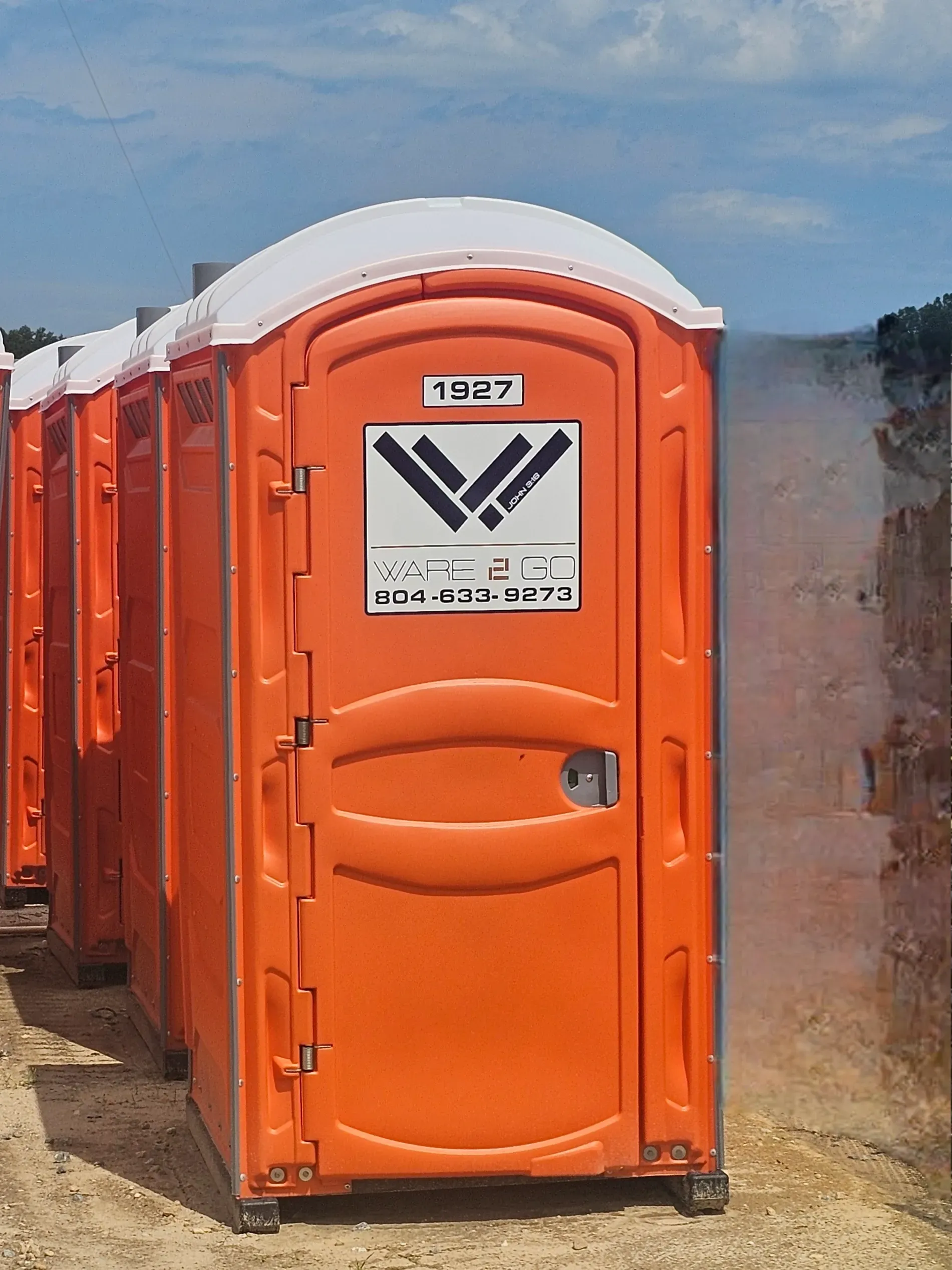Zero Waste Goals and the Role of Portable Toilets in Sustainable Construction in 2025

In 2025, the construction industry is rapidly advancing toward sustainability, with zero waste goals at the core of its transformation. Portable toilets, once considered a mere site necessity, have evolved into critical components of sustainable building practices, supporting both environmental conservation and compliance with certifications such as LEED (Leadership in Energy and Environmental Design), as described by the U.S. Green Building Council (USGBC).
This article explores how portable toilets contribute to zero waste objectives in construction, supporting LEED certification efforts and broader green building initiatives in 2025.
The Importance of Sustainable Sanitation Solutions in Construction
Portable sanitation is essential for maintaining hygiene, worker safety, and productivity on construction sites. However, its role in sustainable construction extends far beyond basic functionality. Modern portable sanitation solutions are designed with sustainability in mind, integrating features that help construction projects minimize their environmental footprint.
Water Conservation
Traditional flush toilets consume significant amounts of water, which is a challenge on construction sites where water access is often limited. In contrast, contemporary portable toilets frequently employ low-flow or waterless designs, dramatically reducing water use. These innovations align with the Water Efficiency credits in LEED, which reward projects that minimize water consumption.
Waste Management
Effective waste management is a cornerstone of sustainable construction. Portable toilets facilitate the containment and hygienic removal of human waste, preventing environmental contamination and protecting both workers and the surrounding ecosystem. Some advanced models now feature systems that separate urine and feces, allowing for specialized treatment and potential nutrient recovery—a practice that supports circular economy principles and zero waste goals.
Material Use and Lifecycle
Eco-friendly portable toilets are increasingly constructed from recycled or biodegradable materials, reducing demand for virgin resources. Their modular design allows for easy transportation and reuse across multiple sites, extending their lifecycle and minimizing waste. These practices are consistent with the Materials and Resources credits in LEED, which emphasize the use of sustainable building materials and efficient waste management.
Portable Toilets and LEED Certification
LEED certification is a globally recognized symbol of sustainability achievement. The process is rigorous, requiring projects to meet specific prerequisites and earn points by addressing carbon, energy, water, waste, transportation, materials, health, and indoor environmental quality. Portable toilets contribute to several LEED credit categories, reinforcing their value in green construction.
Sustainable Sites (SS)
By providing adequate sanitation facilities, portable toilets help minimize the environmental impact of construction activities. They prevent soil and water contamination, maintaining the integrity of the construction site and surrounding areas—a requirement for Sustainable Sites credits in LEED.
Water Efficiency (WE)
As noted, water-saving features in portable toilets support Water Efficiency credits. Projects that implement waterless or low-flow sanitation solutions demonstrate a commitment to conserving this vital resource, which is increasingly important in regions facing water scarcity.
Materials and Resources (MR)
Using portable toilets made from recycled or recyclable materials supports the Materials and Resources credit category. Efficient management of waste generated on-site further reinforces these efforts, helping projects achieve LEED’s waste reduction goals.
Innovation (IN)
Innovative sanitation solutions, such as composting toilets or those with advanced waste treatment technologies, can earn projects additional points under the Innovation credit category. These systems exemplify forward-thinking approaches to sustainability challenges and are encouraged by the latest LEED v5 updates, which emphasize decarbonization, quality of life, and ecological conservation.
Industry Trends and Innovations in Portable Sanitation
The portable sanitation sector is undergoing rapid innovation, driven by advances in technology, design, and environmental responsibility.
Luxury and Accessibility Features
Modern portable toilets offer enhanced comfort, with spacious designs, proper ventilation, and sturdy construction. Premium options, such as luxury restroom trailers, include flushable toilets, air conditioning, and stylish lighting, making them suitable for high-end events as well as construction sites. Accessibility is a top priority, with handicap accessible porta potties featuring ramps, handrails, and spacious interiors for wheelchair users—aligning with LEED’s focus on equity and inclusive design.
Eco-Friendly Chemicals and Additives
The use of environmentally safe chemicals is a growing trend in the portable toilet industry. Many providers now offer formaldehyde-free and biodegradable treatments that minimize harm to ecosystems while maintaining hygiene standards. These practices are particularly important on construction sites, where the risk of chemical runoff and contamination must be carefully managed.
The Broader Impact: Public Health and Community Well-being
Portable toilets play a vital role in safeguarding public health, especially in temporary and remote settings. By providing clean portable toilets and accessible sanitation, these units help prevent the spread of disease and maintain worker morale and productivity. In disaster relief and emergency response sanitation services scenarios, portable toilets are critical for maintaining hygiene and dignity in challenging environments. Their ability to be quickly deployed and adapted to diverse needs makes them indispensable tools for both construction and humanitarian efforts—a reflection of LEED’s commitment to quality of life and social equity.
Case Studies: Portable Toilets in Action
Green Construction Site in California
A large-scale construction project in California recently achieved LEED Platinum certification, in part due to its innovative use of portable sanitation. The project utilized waterless portable toilets made from recycled materials, along with onsite composting systems for human waste. These measures not only reduced water consumption and waste but also earned the project additional LEED points for innovation and resource efficiency.
Music Festival in Colorado
A major music festival in Colorado partnered with a portable toilet provider to implement a zero waste initiative. The festival deployed composting toilets and handwashing stations with biodegradable soaps, diverting over 90% of sanitation-related waste from landfills. This approach not only minimized environmental impact but also enhanced the festival’s reputation as a leader in sustainable event management—demonstrating the broader applicability of portable sanitation in achieving zero waste goals.
As the construction industry continues to prioritize sustainable sanitation solutions, the integration of advanced portable toilets into project plans will be essential for meeting environmental standards and promoting a healthier planet. Future trends include advanced waste treatment technologies and ergonomic designs that cater to diverse user needs. The industry is also likely to see increased collaboration between portable toilet providers, construction firms, and certification bodies to develop best practices and standards for sustainable sanitation.
LEED v5: A New Era for Sustainable Construction
LEED v5, launched in April 2025 by the U.S. Green Building Council, represents the most significant update to the LEED standard in over a decade. The new version focuses on decarbonization, quality of life, and ecological conservation and restoration, requiring greater reductions in whole-life carbon emissions and integrating life-cycle assessments for materials and energy. Projects must now demonstrate their ability to withstand climate impacts and address social equity and health throughout the certification process.
LEED v5 introduces a project-level impact reporting system and reinforces transparency, verification, and performance tracking. After certification, every project receives a comprehensive performance report, including carbon metrics, quality of life indicators, and resilience outcomes. These reports support both internal sustainability reporting and external investor or regulatory disclosure.
Conclusion
Portable toilets are more than just a convenience on construction sites—they are integral to achieving zero waste goals and supporting sustainable sanitation building practices. By conserving water, managing waste responsibly, and utilizing eco-friendly portable toilets, portable sanitation solutions contribute significantly to LEED certification and the broader objectives of green construction.
As the construction industry continues to prioritize sustainable sanitation solutions, integrating advanced portable toilets into project plans will be essential for meeting environmental standards and promoting a healthier planet. The U.S. Green Building Council’s LEED v5 framework, with its focus on decarbonization, quality of life, and ecological conservation, sets a new benchmark for the role of portable sanitation in sustainable construction in 2025 and beyond.
Ware2Go Site Services in Central Virginia Can Help
When it comes to eco-friendly sanitation for construction sites in Central Virginia, trust the experts who prioritize cleanliness, reliability, and customer satisfaction. Ware2Go Site Services offers many portable sanitation options, including standard porta potties,handicap accessible porta potties, handwashing stations, and restroom trailers to meet your construction project’s needs.
Ware2Go serves Essex County, Culpeper, Tappahannock, Aylett, Mechanicsville, Louisa County, Spotsylvania County, Caroline County, Richmond and surrounding areas. Ware2Go delivers top-tier, eco-friendly sanitation solutions with timely delivery of portable toilets and responsive service.
To learn more or book your portable toilet rental in Central Virginia, call us at 804-633-9273 or visit our website atwww.w2gositeservices.com. We can build cleaner, greener job sites together!
References
1. U.S. Environmental Protection Agency (EPA):
- Sustainable Materials Management: https://www.epa.gov/smm
2. U.S. Green Building Council (USGBC):
- LEED v5 Official Page: https://support.usgbc.org/hc/en-us/articles/25316160948755-LEED-v5
Tap to share!
Latest Posts







